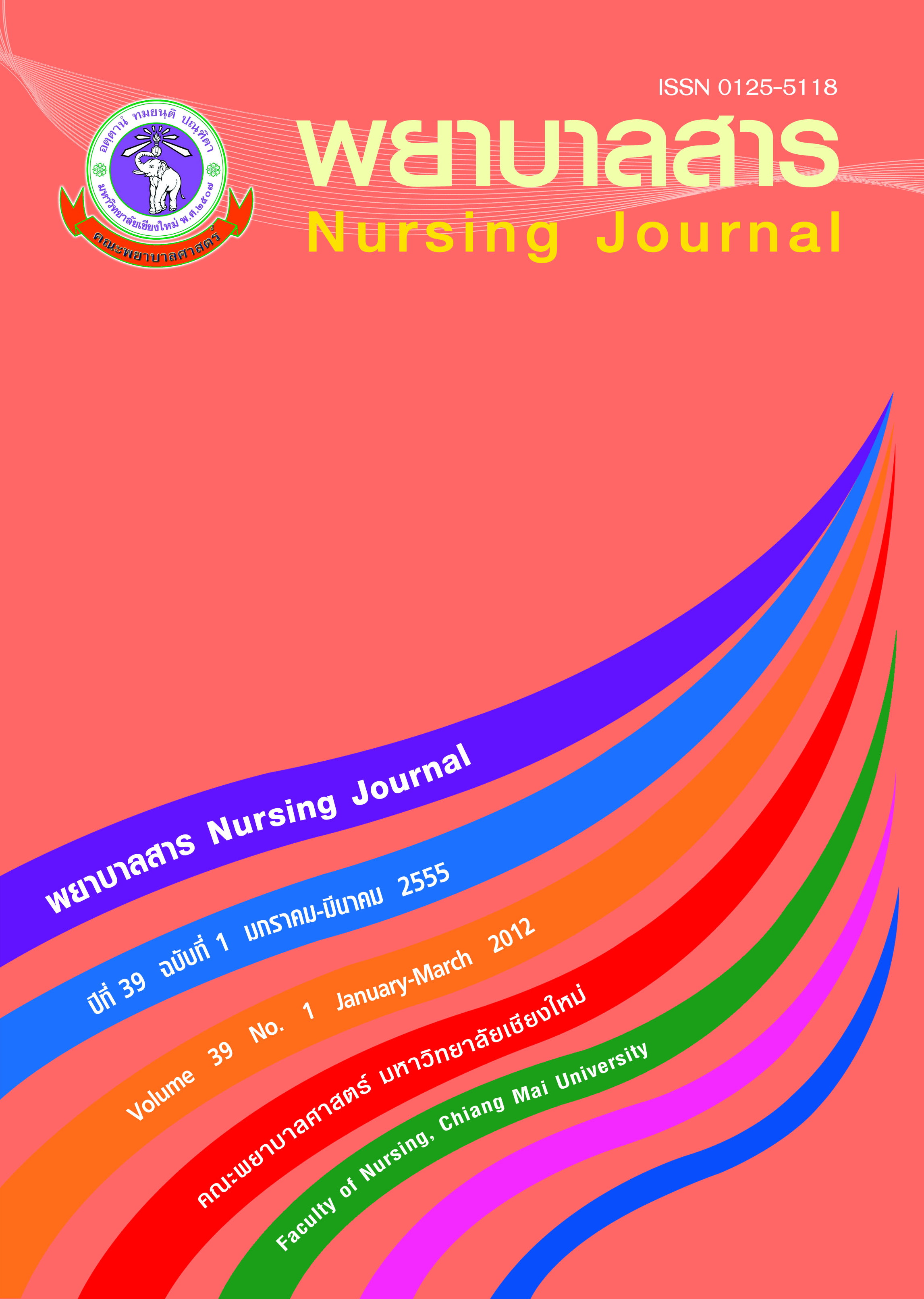ผลของโปรแกรมการส่งเสริมบทบาทสามีต่อพฤติกรรมของสามี ในการดูแลภรรยาในระยะที่หนึ่งของการคลอด
Keywords:
โปรแกรมการส่งเสริมบทบาทสามี, พฤติกรรมของสามี, การดูแลภรรยาในระยะที่หนึ่งของการคลอด, Enhancing a Husband’s Role Program, Husband’s Behaviors, Caring for Wives During the First Stage of LaborAbstract
บทคัดย่อ
การมีส่วนร่วมของสามีในการดูแลภรรยาในระยะคลอดสามารถตอบสนองความ ต้องการทั้งด้านร่างกาย และจิตใจของภรรยา และมีส่วนร่วมในการแบ่งปันประสบการณ์ การคลอด ซึ่งส่งผลให้สามีเกิดสัมพันธภาพกับภรรยาและบุตรมากขึ้น การวิจัยแบบ กึ่งทดลองครั้งนี้มีวัตถุประสงค์เพื่อศึกษาผลของโปรแกรมการส่งเสริมบทบาทสามีต่อ พฤติกรรมของสามีในการดูแลภรรยาในระยะที่หนึ่งของการคลอด กลุ่มตัวอย่าง จำนวน 44 ราย เป็นสามีที่ภรรยาตั้งครรภ์ครั้งแรก มาฝากครรภ์และคลอดที่โรงพยาบาลท่าม่วง จังหวัด กาญจนบุรี ระหว่างเดือนเมษายน ถึง เดือนกันยายน พ.ศ. 2553 เลือกกลุ่มตัวอย่างแบบ เฉพาะ เจาะจงตามคุณสมบัติที่กำหนดแบ่งเป็นกลุ่มควบคุมและกลุ่มทดลอง กลุ่มละ 22 ราย โดยกลุ่มทดลองได้รับการพยาบาลตามปกติและโปรแกรมการส่งเสริมบทบาทสามี ส่วนกลุ่มควบคุมได้รับการพยาบาลตามปกติ เครื่องมือในการศึกษา ประกอบด้วย 1) โปรแกรมการส่งเสริมบทบาทสามีที่ผู้วิจัยพัฒนาตามกรอบแนวคิดของแชปแมน (Chapman, 1992) ร่วมกับการทบทวนวรรณกรรม 2) คู่มือบทบาทสามีในการดูแลภรรยา ในระยะที่หนึ่งของการคลอด 3) แบบสอบถามข้อมูลทั่วไปและ 4) แบบสังเกตการแสดง พฤติกรรมของสามีในการดูแลภรรยาในระยะที่หนึ่งของการคลอด ที่ผู้วิจัยดัดแปลงมา จากแบบวัดพฤติกรรมการแสดงบทบาทบิดาในระยะคลอดของนันทิญา ทองชัย (2540) วิเคราะห์ข้อมูลด้วยสถิติพรรณนาและทดสอบสมมติฐานด้วยสถิติทดสอบค่าเฉลี่ยของ ประชากร 2 กลุ่มที่เป็นอิสระต่อกัน (independent t- test)
ผลการวิจัยพบว่า
คะแนนเฉลี่ยพฤติกรรมของสามีในการดูแลภรรยาในระยะที่หนึ่งของการคลอดของกลุ่ม ทดลองที่ได้รับ โปรแกรมการส่งเสริมบทบาทสามีสูงกว่ากลุ่มควบคุมที่ได้รับการพยาบาลตาม ปกติอย่างมีนัยสำคัญทาง สถิติที่ระดับ 0.05
ผลการศึกษาชี้ให้เห็นถึงประสิทธิผลของโปรแกรมการส่งเสริมบทบาทสามีในการดูแล ภรรยาใน ระยะที่หนึ่งของการคลอด ดังนั้นพยาบาลผดุงครรภ์จึงควรนำไปใช้ในการปฏิบัติการ พยาบาลต่อไปได้
คำสำคัญ: โปรแกรมการส่งเสริมบทบาทสามี พฤติกรรมของสามี การดูแลภรรยาในระยะที่หนึ่งของการคลอด
Abstract
Participation of husbands in caring of their wives during fi rst stage of labor could serve both physical and emotional needs of their wives, and also take part in sharing labor experiences. This could result in increasing the relationship between father, mother and newborn baby. The purpose of this quasi-experimental research was to examine the eff ects of enhancing a husband’s role program in caring behaviors of their wives during the fi rst stage of labor. The subjects included 44 husbands of women undergoing their fi rst pregnancy and who attended antenatal care clinic and delivered at Tha Muang hospital, Kanchanaburi province during April to September 2010. They were purposively selected and randomly assigned equally in number into the control group and the experimental group with twenty-two cases in each group. The experimental group received the enhancing husband’s role program while the control group received the routine nursing care. The research instruments included: 1) the Enhancing Husband’s Role Program, developed by the researcher based on the concept of Chapman (1992) and a literature review, 2) the Handbook of Husband’s Role on Caring for Wives during the First Stage of labor, 3) the Demographic Data Questionnaire, and 4) the Observation form for Husband’s Behaviors in Caring for Wives During the First Stage of Labor which was adapted from the Father’s Role Performance During Labor Questionnaires by Nuntaya Thongchai (2540). Data were analyzed using descriptive statistics and hypothesis was tested by independent t-test.
The results of study
The results of this study revealed that the mean scores of husband’s behaviors in caring for their wives during the fi rst stage of labor of the experimental group was statistically signifi cantly higher than the mean score of the control group (p < 0.05).
The findings of the study indicate the eff ectiveness of enhancing a husband’s role program on husband’s behaviors for wives during the fi rst stage of labor. Therefore, the nurse-midwives should use the program as a guide in nursing practice.
Key words: Enhancing a Husband’s Role Program, Husband’s Behaviors, Caring for Wives During the First Stage of Labor
Downloads
How to Cite
Issue
Section
License
บทความที่ได้รับการตีพิมพ์เป็นลิขสิทธิ์ของวารสารพยาบาลสาร
ข้อความที่ปรากฏในบทความแต่ละเรื่องในวารสารวิชาการเล่มนี้เป็นความคิดเห็นส่วนตัวของผู้เขียนแต่ละท่านไม่เกี่ยวข้องกับมหาวิทยาลัยเชียงใหม่ และคณาจารย์ท่านอื่นๆในมหาวิทยาลัยฯ แต่อย่างใด ความรับผิดชอบองค์ประกอบทั้งหมดของบทความแต่ละเรื่องเป็นของผู้เขียนแต่ละท่าน หากมีความผิดพลาดใด ๆ ผู้เขียนแต่ละท่านจะรับผิดชอบบทความของตนเองแต่ผู้เดียว






